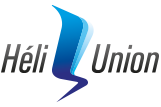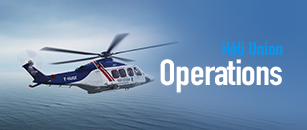SAFETY: ALWAYS BE OUR PRIORITY
The safety of passengers and personnel is always our first concern. This essential value is the priority throughout the company and is paramount in all our procedures. Our CEO, Mr. Patrick Molis, undertakes initiatives to improve the level of safety by drawing on industry’s best practices and by providing the human and financial resources necessary to guarantee that our aeronautic activities are carried out in compliance with the legislative requirements.
As part of our drive for continuous improvement, the Safety Management System (SMS) at Héli-Union is based on risk analysis, the monitoring of flight parameters and the passing on of information involving all concerned in the company. Our SMS policy consists in developing the safety culture based on proactive and preventive risk management. We aim to improve the level of safety and reduce situations that may present operational risks to an acceptable level by applying ALARP principle (As Low As Reasonably Practicable). Our objective is also to protect the health of personnel working for the company and to minimize the impact on the ecosystem by managing the risks inherent in the work environment.
The SMS is a part of a continuous improvement strategy and applies to all Héli-Union activities: air operations, management of airworthiness, maintenance and design, logistic supports and pilot training. To this end, the SMS performance criteria is always analyzed periodically.
Our commitment to safety is also highlighted by our participation in International Helicopter Safety Team (IHST), European Helicopter Safety Team (EHEST), European Helicopter Safety Analysis Team (EHSAT), along with our collaboration with Helicopter Association International (HAI) and Heli Offshore to share and apply best practices as well as harmonized global flight standards.
Héli-Union also implements a Fair Policy, which is one of the most effective techniques to improve safety by setting up procedure for event reporting. Our Fair Policy distinguishes a mistake and a fault. Therefore, we believe that the disciplinary actions for both errors have to be processed differently and fairly.



.svg/1280px-Helicopter_Association_International_(logo).svg.png)









